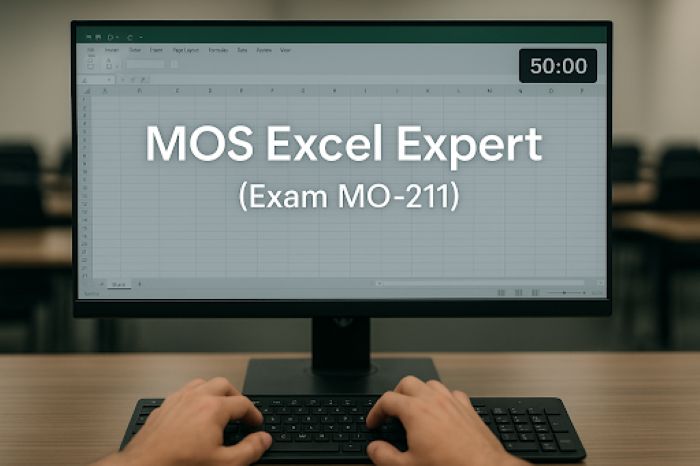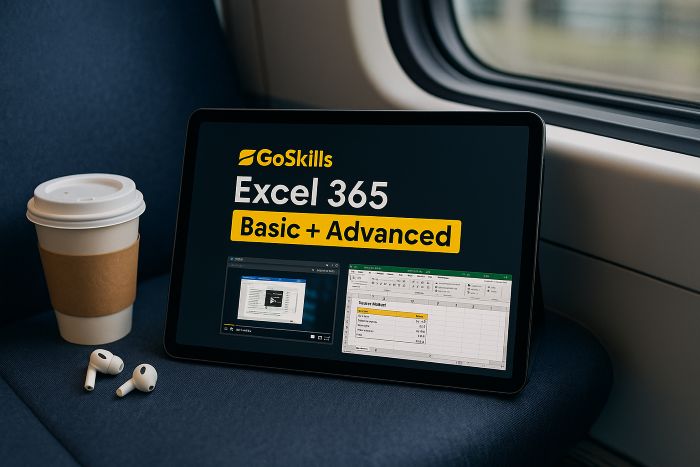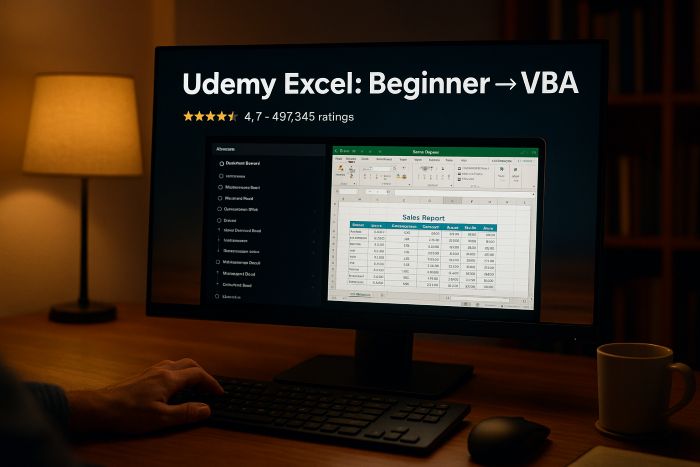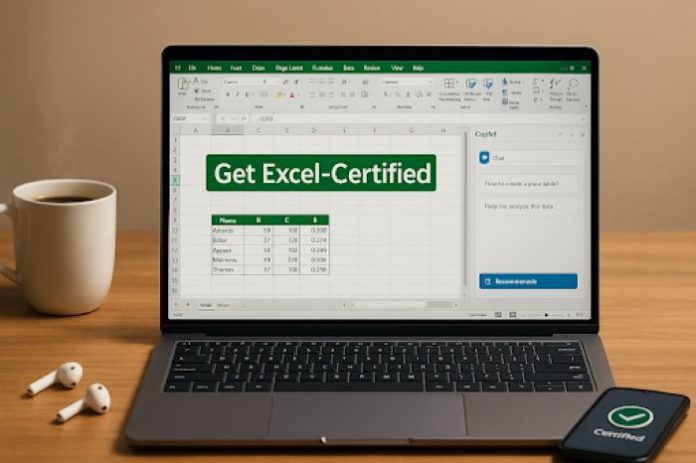Excel still drives decisions in nearly every department. Proving you can master it through an Excel certification pays. Louisiana State University Eunice found that Microsoft Office Specialist (MOS)–certified professionals earn about $16,000 more each year than uncertified peers.
In this guide, you’ll compare 2025’s best ways to get there, from Microsoft’s MOS exam to wallet-friendly bootcamps. We break down cost, study time, and skill fit so you can choose a route today and turn spreadsheet speed into salary momentum.
Key Takeaways
- Excel certification, particularly the Microsoft Office Specialist (MOS), can significantly increase annual earnings by around $16,000 compared to uncertified peers.
- Choosing the right learning path involves evaluating skill level, career goals, budget, and preferred learning style for mastering Excel.
- MOS certification requires dedicated preparation; consider merging courses with practice tests for optimal results.
- Various platforms offer Excel courses, from structured university programs to flexible options like Udemy and GoSkills for different learning preferences.
- Investing time in Excel mastery enhances professional credibility and may lead to better job opportunities and salary negotiations.
Table of Contents
Excel Certification vs. Course Certificate
Microsoft Office Specialist (MOS) certification. A proctor gives you 50 minutes to finish live Excel tasks. A scaled score of 700 / 1,000 passes, and a U.S. exam voucher costs $100–$120. Pass once, and Microsoft issues a Credly badge that recruiters can verify instantly.
Course certificates. Platforms such as Coursera, GoSkills, and Udemy award these after you complete their syllabus and quizzes. Because the provider, not Microsoft, sets the rubric, recognition depends on the brand behind the course (a university seal or Microsoft MVP instructor adds weight).
How most learners combine them. Start with a structured course for Excel certification to build speed and accuracy, then schedule the MOS exam for a credential that Applicant Tracking Systems pick up every time.
How We Evaluated Programs
Our review team asked one question first: Will this course make you faster, more confident, and more marketable in today’s Excel (not the 2016 version)? From there, we scored each provider on seven weighted factors:
- Content depth. Must cover Power Query, dynamic-array functions (rolled out to Microsoft 365 subscribers in January 2020, according to Microsoft), and at least a brief look at Copilot, which reached general availability in September 2023, according to Microsoft.
- Learning experience. Short, focused videos plus hands-on workbooks and quizzes build muscle memory.
- Flexibility. Fully on-demand or adjustable deadlines let busy professionals study in ten-minute blocks.
- Price vs. scope. We compared one-time fees, subscriptions, and bundles, normalizing cost per hour of instruction (for example, a $15 Udemy sale equals about $0.70 per hour).
- Credential weight. MOS badges ranked highest, followed by university or CPD-accredited certificates.
- Support. Active forums, 24-hour instructor response, or live chat turn “stuck” moments into quick wins.
- Freshness. Updated within the last 18 months, with screenshots from Excel 365 and mentions of AI features. Outdated UI or version tags were immediate deal breakers.
Only courses that met or exceeded our benchmarks in all seven areas moved on to the head-to-head comparison.
Microsoft MOS Excel Certification Expert
Treat the MO-211 exam as Excel’s black-belt test. In a 50-minute locked-down session, you’ll build PivotTables, clean data with Power Query, and write nested XLOOKUPs while a timer races on screen. Score 700 / 1,000, and Microsoft issues a Credly badge that recruiters can verify in seconds.
Why it matters: the badge is brand agnostic; finance desks, marketing agencies, and government offices all keyword-filter for “Excel certified.”
Preparation is substantial. Microsoft recommends about 150 hours of instruction and hands-on practice before sitting an expert-level Office exam. Most learners pair a full course with CertPREP practice tests to build speed.
Cost: A U.S. exam voucher costs $120 through Certiport. If you fail, you’ll pay again unless you bought a retake bundle.
What you gain
- Universal recognition and a lifelong badge for the 365 / 2019 version
- Proof of expert-level skill without explaining the Excel certification course behind it
What to watch out for
- Windows-only testing environment; Mac users should practice on a PC or virtual machine
- No partial credit. Every task must be completed exactly
Bottom line: If you need a credential that stands on its own, the MOS Excel Expert badge is the gold standard and worth the study marathon that precedes it.

GoSkills Excel Basic & Advanced
Think of the GoSkills Excel Course as the on-ramp to MOS mastery. The Excel 365 – Basic & Advanced track packs 61 bite-size lessons (about 5 h 46 m of video). Each runs 3–7 minutes and comes with a workbook for hands-on practice. The syllabus flows from formulas to tables, PivotTables, and macros, so by the time you reach VBA, earlier skills feel automatic.
Credibility checks out. The curriculum is CPD-accredited and written by Ken Puls, a 13-time Microsoft Excel MVP. Because GoSkills is a Microsoft Partner, every screenshot matches the current 365 interface.
Cost is simple: $39 per month after a seven-day free trial. Most learners finish in four to six weeks, so the bill often stays under $60. Cancel after the final quiz and keep your certificate.
Extras that matter
- Mobile and tablet apps for studying on the go
- Responsive chat support plus discussion threads below each lesson
- Certificates you can add to LinkedIn, complete with CPD hours
If you want guided practice from an MVP instructor without university prices, GoSkills delivers a quick, structured path to expert-level Excel skills.

Coursera Excel Skills for Business (Macquarie University)
This four-course specialization from Macquarie University feels like a semester of Excel, minus the lecture hall. Over about three months at 10 hours a week (Coursera lists “3 months to complete”), you move from absolute zero to building interactive dashboards through weekly videos, graded assignments, and a capstone that tells a data story instead of just crunching numbers.
The structure keeps you on track. Weekly deadlines create momentum, and you can reset them with one click if work flares up. Discussion boards with more than 600,000 classmates provide formula tips and peer reviews.
Because the certificate carries Macquarie’s seal and holds a 4.9-star rating from 47,000 reviews, it signals rigor to hiring managers who value university credentials.
Cost is pay-as-you-go: $49 per month for Coursera Specializations. Finish in four months, and the bill lands near $200; study longer, and the total rises with each month.
If you want academically framed training and a logo recruiters recognize, treat this program like a part-time class. Block study hours each week and lean on the forums when assignments push your limits.
edX Excel for Everyone (University of British Columbia)
The Excel for Everyone Professional Certificate from the University of British Columbia focuses on data analytics. Across three courses, Core Foundations, Data Management, and Data Analysis Fundamentals, you’ll clean messy imports with Power Query, model data, and build publication-ready dashboards.
- Format: Sessions run in global cohorts with weekly quizzes and TA-moderated Q&A threads, so you move through each module alongside classmates rather than studying alone.
- Workload: edX lists five months at 3–5 hours per week (about 60–75 total hours) to finish all three courses.
- Cost: The full certificate costs $510 (discounted from $567) when purchased as a bundle on edX.
- Value: A shareable UBC badge and portfolio projects signal academic rigor, helpful if you plan to shift from spreadsheets to SQL or Python later.
Treat it like a marathon. Block a couple of evenings each week and lean on cohort forums when formulas get tricky. Finish, and you’ll be fluent in Excel’s data tools and ready for more advanced analytics work.
Udemy Excel: Beginner to Advanced
Udemy’s bestseller is a fast-track option for Excel skills. A $15–$20 sale unlocks 22 hours of video and lifetime access. Taught by Kyle Pew, a Microsoft Certified Trainer with 1.6 million students and a 4.7-star rating, the course combines four levels, beginner, intermediate, advanced, and macros/VBA, into one package.
You learn by copying each step on Kyle’s screen with the downloadable workbooks. The Q&A board, home to thousands of past threads, usually surfaces an answer before the instructor needs to step in. The course has no graded capstone, so you won’t leave with a portfolio piece, but you will know how to build PivotTables, write LOOKUP formulas, and record simple macros.
Reality check: The certificate is Udemy-branded, not Microsoft or university-backed, so treat it as proof of initiative rather than a résumé headline. Even so, at roughly $0.70 per instructional hour, it remains a quick, low-risk jump-start or reference library you can revisit whenever a colleague asks, “Can you whip up a quick dashboard?”

Specialized and Niche Options
Need Excel tuned to a specific arena? These programs skip the general syllabus and sharpen one skill.
Corporate Finance Institute: Advanced Excel Formulas & Functions
- Focus: analyst-grade formulas, dynamic arrays, and financial-model shortcuts
- Cost: $497 per year for CFI all-access membership
- Credibility: CPE-eligible and accredited by NASBA and CPA bodies
Ideal if you work in valuation models and want INDEX-MATCH logic to feel like muscle memory.
Chandoo.org: Excel School & VBA Bootcamp
- Focus: dashboards, user forms, and VBA that trims a monthly report from two hours to two clicks
- Cost: $147 for Excel School or $247 with the Dashboards add-on
Alumni often mention promotions that repaid the fee in a single bonus cycle.
DataCamp: Excel Fundamentals & Intermediate Tracks
- Focus: browser-based exercises that build spreadsheet skills and introduce coding logic
- Cost: $14 per month for Premium (billed annually)
The interactive sandbox makes the jump to SQL or Python feel less intimidating.
These niche courses will not replace a complete curriculum or the MOS exam, but they polish targeted skills standard paths may skim past—perfect once you have the basics and want expert-level finesse.
How to Choose the Right Path for Excel Certification
- Gauge your current skill. Can you build a SUMIF without looking up the syntax? Have you created a PivotTable before? Honest answers place you in the right lane, beginner, intermediate, or advanced, and save study time.
- Align the lane with the goal.
- Instant credibility for a job hunt? Book the MOS Excel Expert (MO-211) exam within 90 days of starting prep. Pair a focused course with practice tests to keep momentum.
- Broad competence without a credential? Pick an all-in-one curriculum such as GoSkills or Udemy that moves from formulas to macros in about 25 hours of video and practice files.
- Academic prestige plus depth? Coursera’s Macquarie or edX’s UBC programs add university seals, but require 10 hours a week for 3–5 months. Treat them like part-time classes and lean on peer forums when assignments stretch you.
- Match cost to pace. Subscriptions (Coursera, GoSkills, DataCamp) reward fast finishers; one-time purchases (Udemy, Chandoo) suit a slower pace. Estimate total months × subscription fee before you commit.
- Respect your learning style. Some thrive on deadlines and discussion threads, while others prefer late-night solo sessions. Choose the environment you will stick with, because consistent practice, not the curriculum itself, turns keystrokes into mastery.
Conclusion
Excel mastery is more than a résumé bullet; it can add up to $16,000 to your annual salary, according to Louisiana State University Eunice research. Whether you earn a MOS Expert badge, complete a university specialization, or power through a budget-friendly Udemy course, the payoff appears in faster workflows, cleaner analysis, and stronger bargaining power during raise talks.
Choose the learning path that fits your goal, block study time on your calendar, and practice in live workbooks every day. Commit for 3–6 months, and you’ll shift from asking the Excel person to being the Excel person, turning raw data into decisions that move your career forward.
Quick FAQs
Is an Excel certification worth it? Yes, especially early in your career or when you pivot fields. A MOS Excel Expert badge or a respected university certificate puts verifiable proof of skill on your résumé and can support requests for higher pay or promotions.
How long does it take to get certified? From scratch, plan 3–6 months of steady study (about 150 hours) before booking the MOS exam, the prep time Microsoft recommends. Already comfortable in Excel? A focused four-week sprint with daily practice and a full-length mock test is often enough.
What is the cheapest way to learn Excel? Start free:
- LinkedIn Learning offers a one-month trial that includes all Excel courses.
- Coursera lets you audit most courses at no cost; you pay only if you want the certificate.
- YouTube channels such as ExcelIsFun and Leila Gharani cover almost every topic.
Need structured practice? Udemy’s site-wide promotions drop many Excel courses for Excel certification to $9.99 to $15, a one-time fee for lifetime access.











